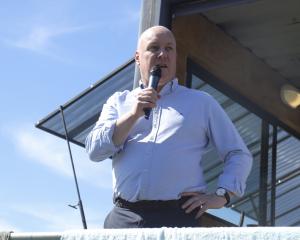
I am invested in the new Dunedin hospital. It is a deeply personal issue for me. I’ve been treated there when sick, my dad was in ICU and had a heart by-pass after, and my husband works and trained there.
I believe the people of the South deserve the best health care. Critical to that is a new state-of-the-art Dunedin hospital.

Everything I have seen, read and heard leads me to believe that will be true. Our neighbours will complain about how big a slice of the funding pie we received.
But we only get one chance to get this right, and that is why I am unapologetic about advocating on behalf of Dunedin for the things that matter most in this hospital build.
Ensuring we get the best hospital is a long process. The final hospital will now be north of $1.5 billion. When you are spending this much money, it is important to get things right, and that means layers and layers of design - which gets more detailed and better with every iteration.
We need to focus on the issues that matter.
Am I concerned if a building changes from a triangle to a rectangle? Only if it means more usable space.
Am I concerned about a new and different collaborative teaching model progressed through the proposed inter professional learning centre? If it means more effective spending and better clinical outcomes, I’m all for it.
My focus is on clinical outcomes for us and our families. And that is why I was pleased to see Dunedin City Council pass a motion to campaign to protect clinical outcomes for the people of the South. I agree; what really matters is outcomes for patients. We need to concentrate on how the hospital is set up to achieve better outcomes.
Unfortunately, the focus of recent debates risks drifting on to less productive matters. Asking which plan or which of many business cases adopted along the way is the right one becomes a distraction from the real issue of outcomes for us and our families.
Reporting in the Otago Daily Times might lead some people to believe the new Dunedin hospital will be smaller than the existing hospital. Nothing could be further from the truth.
The new hospital will be bigger and better. The existing hospital is 70,000 sq m. The new state of the art hospital will be 90,000sq m.
The current hospital has 367 beds. The new hospital will have more beds on opening day, and space for 410 beds when it is fully up and running. That is before counting around 20 beds in the new "23 hour" ward that don’t get counted as "beds".
So, if we accept that the new hospital will be state of the art, bigger, with more beds and theatres, what are the issues that we need to campaign on?
I believe if we are going to persuade the decision-makers to alter course as the final blueprints are drawn up, we need to appeal to their best natures and the thing every person in health signed up for: getting the best outcome for those who need care. We need to be crystal clear on the issues we want to see addressed.
Here’s my list of assurances we need to have to know our hospital will be fit for purpose:
1 - Will the accompanying IT capacity will be up to scratch, and what is the budget for it?
2 - Will the necessary training and recruitment of the various health professionals be adequate?
3 - When will the critical new interprofessional learning centre be approved and funded by our university, polytech and health system?
4 - If some of the beds originally planned to be available for older people with dementia are shelled because more care should be provided in the community, where is the funded plan for care in the community?
5 - If collaboration spaces are important for attracting staff and are usually measured by seats available in informal meeting spaces, how many were in the original plan, and what assurances do we have those spaces will be found in the final build?
6 - Will the available pathology space will deliver a safe and adequate service. Where is the evidence?
You will see my list does not say "build according to a specific business case that, two years after sign off is already a little out of date".
I believe such an approach is intellectually lazy, and misses the critical importance of clinical outcomes.
If we are not clear about what we want, or ask for things which will cost more - and do less - we will do ourselves and the people of the South no favours.
- Rachel Brooking is the chair of Parliament’s finance and expenditure committee and is the Labour candidate for Dunedin in the 2023 election











